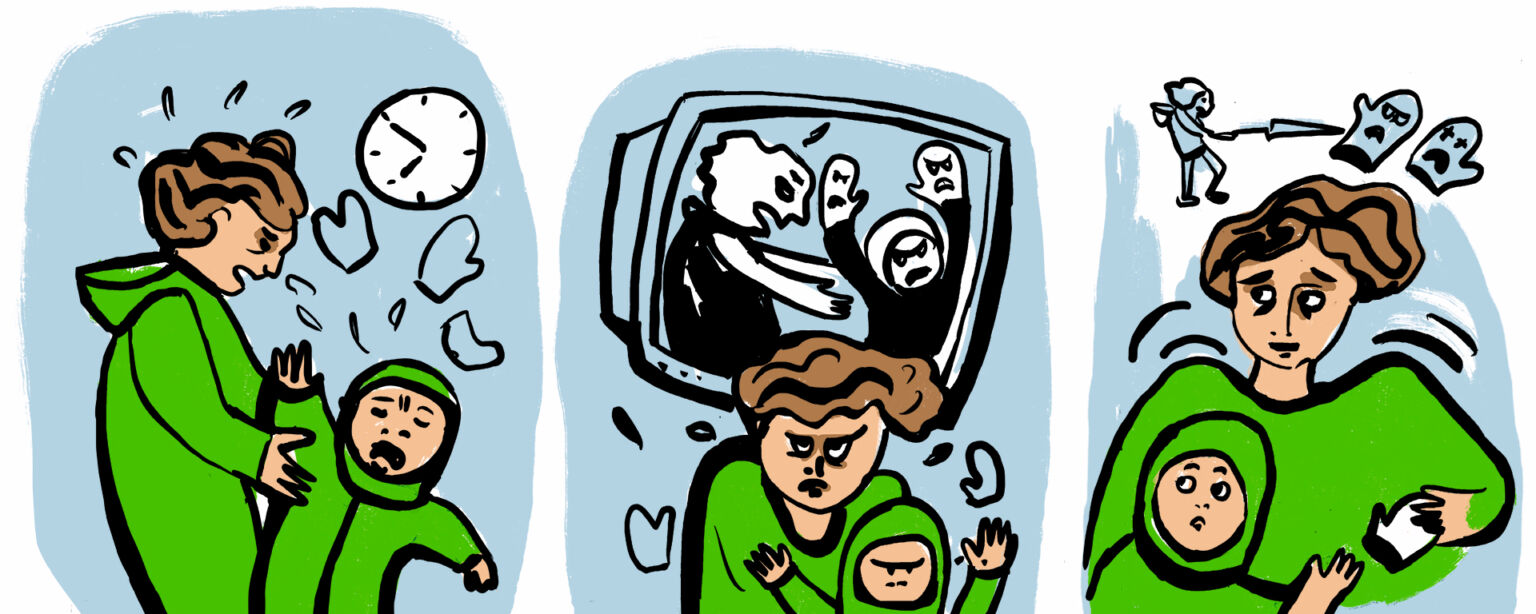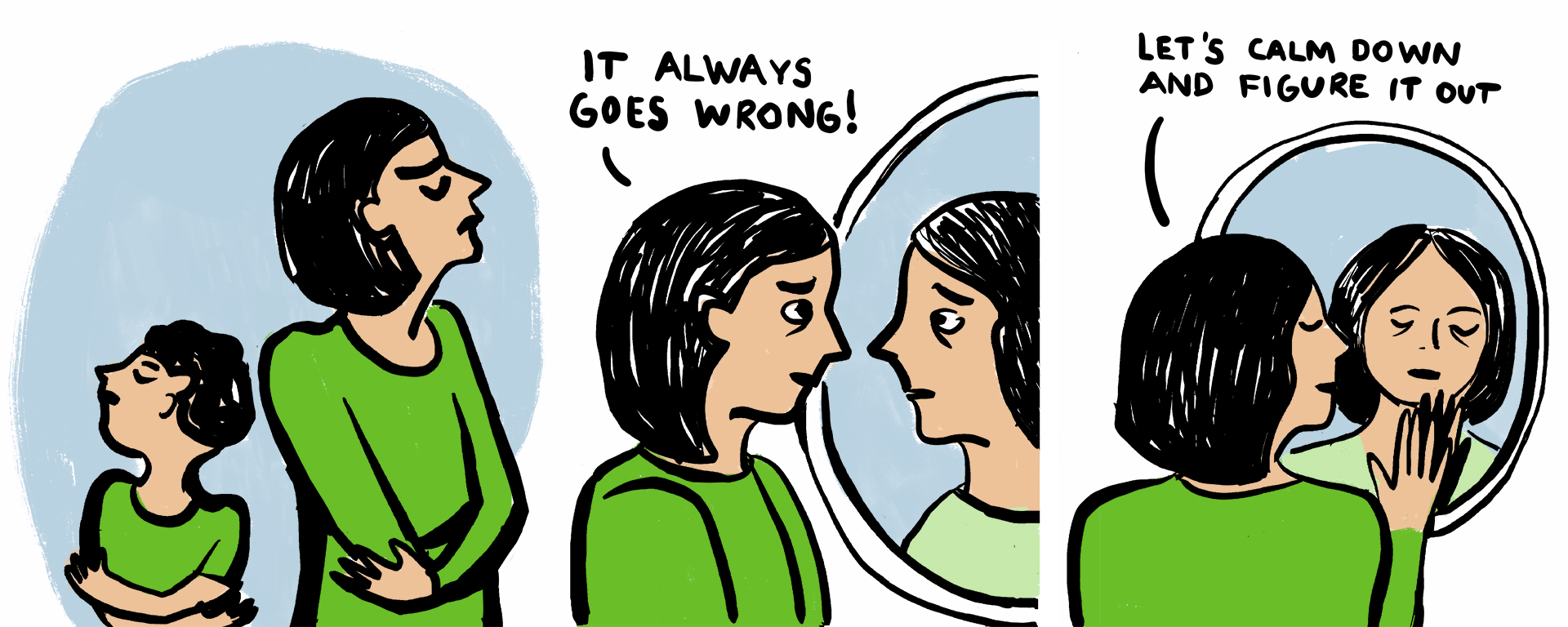
Challenging emotions in parenthood
Emotions that people find challenging in parenthood
Challenging emotions can occur as a result of concrete events in parenthood, but they can also arise from things that didn’t go as planned or happen at all. Challenging emotions also mix with one another, and include sadness, disappointment, frustration, feelings of inadequacy, anxiety, exhaustion, irritation, and depression. Parents may think things like:
- Parenthood isn’t what I thought or hoped it would be.
- I didn’t have the number of children or the family I wanted (for example, age differences between siblings, differences of opinion with your partner on how many children you want/have, divorce, single-parenting).
- Your relationship with your children can be difficult or different from what you had hoped for, or your child might face challenges that make you feel helpless.
- Your child’s relationship with their other parent isn’t what you had hoped for.
- Your child’s relationship with their grandparents is difficult or non-existent.
- The thought that no other parent thinks this way, and the subsequent loneliness and feelings of being on the outside.
- The thought of being a failed parent or of not having been able to do the best for your child.
We all often have two families: the perfect one that we think we will have, and the one we actually have. Parenthood brings a wide range of emotions and expectations with it. During pregnancy, and even earlier, future parents may have ideas about their future family life, being a parent, their relationship, and the future. In parenthood, we face not only our own expectations, but also society’s expectations and norms that lead us to think that parenthood and family life are a certain way, strengthening a culture of coping.
When life isn’t what I hoped for and dreamt of
Dreams and ideas of the future can change along the way, and it can be difficult and challenging to face disappointment, sadness, and various emotions. Sometimes, people may feel a strong sense of bitterness about lost dreams.
Being aware of and identifying your own feelings and emotional reactions is one step forward. Sadness or disappointment about what wasn’t or what didn’t happen can travel with us through life. A difficult emotion can be stronger in one phase of life than in another. Sometimes sadness can be quickly forgotten or pushed aside, but at other times, it may stay with us for a long time.
Here is one way to look at the phases you can apply to difficult emotions that occur during parenthood:
- Phase: A person may begin to strive towards a so-called prohibited emotion more strongly and concretely, and it takes a lot of energy to manage and avoid the emotion. People often don’t want to think like this, and they might think that there’s something seriously wrong with them for thinking that way. There may also be physical symptoms.
- Phase: The person begins to understand that dealing with the emotion and related matters may be unavoidable. At this point, there may be an increased need to talk about the issue, to find causes or to place blame, and begin to do something to alleviate the difficult feeling.
- Phase: When the person begins to deal with the so-called prohibited emotion, they do not feel better straight away, and may indeed feel worse for a time. Dealing with the emotion can involve intense sadness, longing, anger, bitterness, or fear. They may think about what they have lost and why that causes such strong emotional reactions. During the processing phase, emotions can blur into one another and cause various emotional outbursts. Joy and relief may also be part of this emotional scale.
- Phase: An attempt to accept feelings and events, to find balance, and to approach the future more hopefully. The person is able to find a way to accept their emotions as part of their own story. Seeking help and peer support can often normalise your own difficult emotions, disappointment, and sadness. This all helps to refocus your resources and move forward.

Challenging emotions in parenthood
Listen to yourself and to your body. Ask yourself the following questions:
- Do I feel things like disappointment, frustration, depression, irritation, or low mood that can relate to feelings that are “prohibited” in parenthood?
- What unfulfilled ideas and dreams evoke strong emotions in me? Do I dare to confront them? Will I have to use my resources to manage these emotions?
- How does my body react to the emotion? Do I feel pain or tightness in my chest, do I feel short of breath or restless? What helps when I have an emotional reaction?
- Have I spoken about these difficult emotions with anyone? Who could I talk to? If my friend were to tell me about their own difficult emotions in parenthood, how would I relate to them?
- What are my current resources and what things help me to move forward with these emotions?
What can I do?
- Is there a safe friend or family member, or a professional that I could talk to about challenging emotions relating to parenthood? Remember that the Family Federation of Finland’s offers services free of charge.
- How could you increase your wellbeing? It’s often significantly easier to deal with difficult emotions when you are otherwise as well as possible. Is there perhaps something small you could do to move you in the right direction today?
- Peer support groups often consist of people who think in a similar way, and finding such a group can often alleviate feelings of loneliness and of being on the outside. Different groups that reflect different family situations can be found online.
- Check the emotional regulation skills section of this course to find suitable methods to help you face and deal with difficult emotions.
